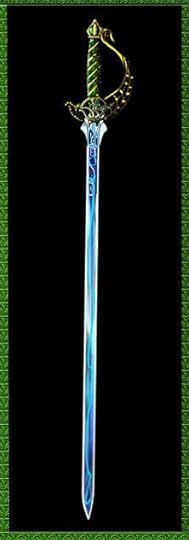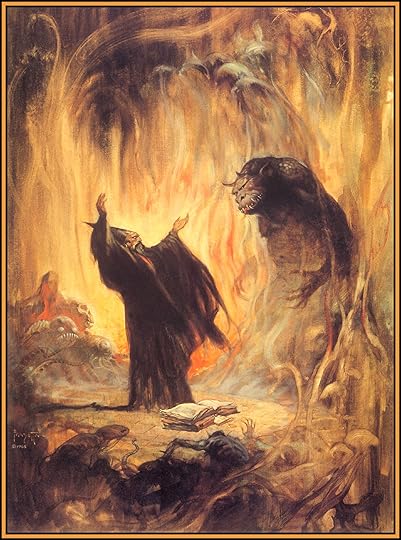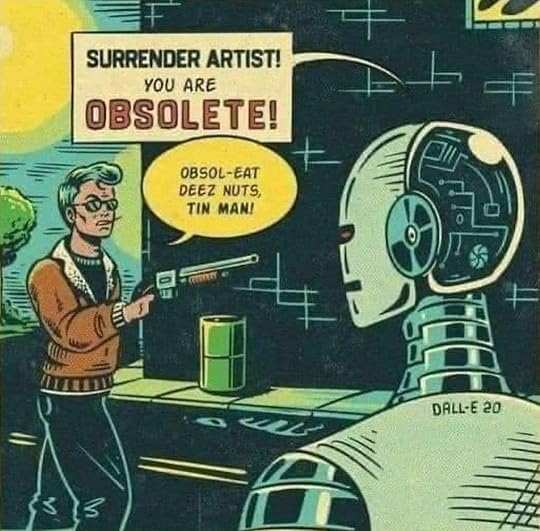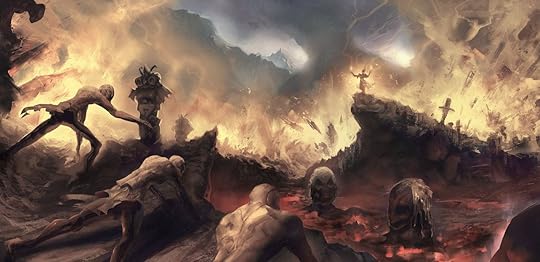Juho Pohjalainen's Blog: Pankarp - Posts Tagged "ai"
Magic Sword
Stormbringer, Grayswandir, Sting and Anduril, Dragonslayer... as far as I'm concerned, a Sword & Sorcery tale is rarely complete if their hero does not wield a magic weapon. Here's the iconic weapon of one of my first heroes.

Void is a shortsword with a pitch-black blade - like a hole in reality rather than a slab of metal. It's light as a feather, well-balanced, and sharp enough that even a weedy three-foot-tall bugbear can cut off limbs with a single strike, or carve into hard stone as if it were soft clay. So far so good, but on a more sinister note, whatever strange substance its blade is made out of, it drinks light: nearby sources of illumination flicker and dim whenever the sword is brought anywhere near, and touching a candle or a torch, or a lit fireplace or a weak lamp, will have the light instantly snuff out and die. A very nice weapon for a sneaky skulker, then. But be wary, for if you can drink something, you can drown in it: more powerful lights such as the midday sun will render the sword brittle and weak, and powerful blinding bursts might even cause it to disintegrate altogether. It's never truly gone, reforming as soon as you place a hilt someplace dark for a couple days... but it's still an inconvenience, often a lethal one.
What is it made out of, how, and by whom? This is a sketchy thing, for no one truly knows, not even myself. It could be an advanced weapon of hardened dark - like an anti-lightsaber - constructed by alien beings with unknown superscience... or it could have been forged out of winter-metal by an ancient and semi-divine blacksmith, employing sorceries and blessings along with an enchanted hammer. Whatever it was, they built in one final secret, a sinister trait of the weapon that even Peal is only vaguely aware of:
It's intelligent. Be it a minor demon captured into the hilt or an advanced and efficient A.I. programmed by alien beings, the weapon has a will of its own. It's not much of a will, only minor instinctive urges that Peal can usually dismiss altogether without even noticing... but sometimes he feels the same murderous intent as the weapon does, and its faint whispers are all it takes to drive him over the edge. It may or may not be what fanned the flames leading to the infamous Red Mending.

Void knows one thing, and one thing only - it is a killing tool. Not for hunting like spears, not for chopping wood like axes, not for forging or repairing like a hammer: a sword is made for taking lives and nothing else. So it does just that. Whenever struck in anger, it will kill, even if the blade has to alter reality to make it so: should the victim survive, the universe will think them dead anyway and bring forth some crazy accident to correct the matter. Take a scratch of the sword, and a stray arrow will soon hit you in the eye, or your footing slips and casts you into the abyss, or if nothing else, you have a fatal heart attack. It's like a virus, maliciously rewriting the source code of the universe to work its will.
Void is a +4 weapon of Chaotic alignment, with an intelligence score of 7 and an Ego of 13 (Peal's ego is 32, indicating how unlikely it is for it to ever grab a true hold of him), and the special purpose to, sure enough, kill. Any light source will fall one step dimmer anywhere within thirty feet of it, or two steps within one foot - going out altogether if this would make it less than dim. Upon injury, the victim must make a saving throw versus death or, you guessed it, drop dead by next round.
This year's NaNoWriMo will feature another sword, cast into the distant past to do battle against the serpent-men that at this time hold humanity as livestock. It's a Lawful thing, to contrast the above weapon: its mind is that of a future scientist named Aizuv, a very neat and orderly person that wishes for humankind to unite and throw off the yokes of Chaos; while the steel forged around him has been enchanted to kill off snakemen specifically.
It might be technically the very first sword in existence: neither serpent-men nor their human slaves possess the metalworking knowledge for forging some, and mainly wield spears and bows.
Its precise powers and abilities are yet to be determined.


Void is a shortsword with a pitch-black blade - like a hole in reality rather than a slab of metal. It's light as a feather, well-balanced, and sharp enough that even a weedy three-foot-tall bugbear can cut off limbs with a single strike, or carve into hard stone as if it were soft clay. So far so good, but on a more sinister note, whatever strange substance its blade is made out of, it drinks light: nearby sources of illumination flicker and dim whenever the sword is brought anywhere near, and touching a candle or a torch, or a lit fireplace or a weak lamp, will have the light instantly snuff out and die. A very nice weapon for a sneaky skulker, then. But be wary, for if you can drink something, you can drown in it: more powerful lights such as the midday sun will render the sword brittle and weak, and powerful blinding bursts might even cause it to disintegrate altogether. It's never truly gone, reforming as soon as you place a hilt someplace dark for a couple days... but it's still an inconvenience, often a lethal one.
What is it made out of, how, and by whom? This is a sketchy thing, for no one truly knows, not even myself. It could be an advanced weapon of hardened dark - like an anti-lightsaber - constructed by alien beings with unknown superscience... or it could have been forged out of winter-metal by an ancient and semi-divine blacksmith, employing sorceries and blessings along with an enchanted hammer. Whatever it was, they built in one final secret, a sinister trait of the weapon that even Peal is only vaguely aware of:
It's intelligent. Be it a minor demon captured into the hilt or an advanced and efficient A.I. programmed by alien beings, the weapon has a will of its own. It's not much of a will, only minor instinctive urges that Peal can usually dismiss altogether without even noticing... but sometimes he feels the same murderous intent as the weapon does, and its faint whispers are all it takes to drive him over the edge. It may or may not be what fanned the flames leading to the infamous Red Mending.

Void knows one thing, and one thing only - it is a killing tool. Not for hunting like spears, not for chopping wood like axes, not for forging or repairing like a hammer: a sword is made for taking lives and nothing else. So it does just that. Whenever struck in anger, it will kill, even if the blade has to alter reality to make it so: should the victim survive, the universe will think them dead anyway and bring forth some crazy accident to correct the matter. Take a scratch of the sword, and a stray arrow will soon hit you in the eye, or your footing slips and casts you into the abyss, or if nothing else, you have a fatal heart attack. It's like a virus, maliciously rewriting the source code of the universe to work its will.
Void is a +4 weapon of Chaotic alignment, with an intelligence score of 7 and an Ego of 13 (Peal's ego is 32, indicating how unlikely it is for it to ever grab a true hold of him), and the special purpose to, sure enough, kill. Any light source will fall one step dimmer anywhere within thirty feet of it, or two steps within one foot - going out altogether if this would make it less than dim. Upon injury, the victim must make a saving throw versus death or, you guessed it, drop dead by next round.
This year's NaNoWriMo will feature another sword, cast into the distant past to do battle against the serpent-men that at this time hold humanity as livestock. It's a Lawful thing, to contrast the above weapon: its mind is that of a future scientist named Aizuv, a very neat and orderly person that wishes for humankind to unite and throw off the yokes of Chaos; while the steel forged around him has been enchanted to kill off snakemen specifically.
It might be technically the very first sword in existence: neither serpent-men nor their human slaves possess the metalworking knowledge for forging some, and mainly wield spears and bows.
Its precise powers and abilities are yet to be determined.

Published on October 30, 2020 08:16
•
Tags:
ai, aizuv, heroes, intelligent-weapons, magic-swords, peal, serpent-men, swords, virus, void
Ye Olde Useless Magick
Imagine questing for an ancient spell of awesome power, overcoming many dangerous trials and perils, one of your friends even sacrificing his life to break the seal. Then at last you get to whip out this planet-buster against the Dark Lord. And you find that it has all the power of a wet fart.

This is the predicament that the players of the 1988 Final Fantasy II found themselves in. The fabled Ultima spell, sealed away in the ancient days for its world-shattering potential, turned out to be effectively useless. Even the Emperor's mooks could pretty safely survive even a higher-level blast. The whole plotline was dropped just about as you learned the spell, and you never once need to actually cast it. Poor Minwu died for naught.
Allegedly we have one of the programmers to thank for this: he figured that such an old and outdated spell simply could not stand relevant in the face of newer and more refined techniques. That magic would naturally have advanced leaps and bounds in the many ages since Ultima had ruled the earth, and that even a simple fire spell, taken for granted by young wizards of today, could match or even overshadow it. Imagine Greek Fire, a deadly secret weapon of antiquity, pitted against modern bomber plane with a cargo hold full of napalm. You can't really argue with that.
Yet argue with it I shall!
Yes, cars get faster and safer, life-saving medicine more reliable, and communication devices more sophisticated. Technology improves. Science marches on. Problem is, as me and many others have elsewhere argued, magic is not science. It's pretty much the polar opposite of technology. Magic is art. And with art, I'm sad to say that these past few decades, if anything, we've regressed.

Art is hard work. Blood and sweat and tears. Cunning and problem-solving. Focus and desire. Patience and sacrifice. Whatever your canvas - paper, notepad, piece of code, circle of summoning, artifact of doom - you're pouring your soul onto it for all to see. Your anger and frustration, your depression and self-doubts, it's all fuel in the fires of creation. You rack your brain to figure out how it all comes together, and get real inventive to pull off things no one else ever has. You need to be conservative with what you put in, and lean into your limitations, turn them into advantages.
You wouldn't even have started if you didn't think it would be worth it. You won't ever give up until it's perfect and just right. Every hardship you face, every hurdle, even the tiniest of chores and errands and maintenance, only serves to fuel your determination and conviction and keep you focused on the task. And the harder the road, the more rewarding it is when you reach the end - the greater the end result, and the greater the lessons you've learned of your craft, of life, of yourself.
And technology gets in the way of that. It makes things easier, and this is one place in the world where this should not happen. It's like putting an escalator up a tall mountain road. Sure, the view's still great, but it doesn't feel the same way. You don't feel any ache or pain and your muscles didn't grow at all. It's not an adventure anymore, you could've just gone up there on a whim.
True enough, typing up a whole book is still pretty tough, even on a computer. There's still effort and great lessons and the beautiful sense of accomplishment, none of that has gone anywhere. Even to this day, great fantasies and biographies let us marvel the souls and blood of their authors.
 ut how's your handwriting doing? Wouldn't it just look so much grander with your own personal style of calligraphy and fancy medieval illuminations? Can you manage anything better than chicken-scratches now, since our whole society, including the work of art, gives no incentive to do such things anymore? And if you had a story in mind that truly deserved such attention - one you wanted to go the extra mile for - just what kind of an amazing fantasy would it have to be?
ut how's your handwriting doing? Wouldn't it just look so much grander with your own personal style of calligraphy and fancy medieval illuminations? Can you manage anything better than chicken-scratches now, since our whole society, including the work of art, gives no incentive to do such things anymore? And if you had a story in mind that truly deserved such attention - one you wanted to go the extra mile for - just what kind of an amazing fantasy would it have to be?
It's the same story all over. There's a reason most of us prefer practical effects over CGI, real costumes and camera tricks and big-ass model castles; a reason the first Jaws movie was a classic, the shoddy and uncooperative shark prop turned into a great advantage, when in the modern day that'd have thrown the big computer-monster front and center in every shot and ruined the whole thing. Even the new Puss In Boots movie, beautiful as it is, obvious as it is that its creators cared and put their heart into it and came up with all these new effects and tricks, it still can't hold a candle to AKIRA that came out decades in the past. And the modern plague of noodle-handed bean-mouths, cheap and simple to do, are widely and justly mocked.
And now the AI. Now at last, with the arrival of the great apocalyptic beasts GPT and Midjourney, all effort can be excised. All thought can be put away, all cunning snuffed out, all uniqueness made cheaply available everywhere, all meaning lost. I envision a dark age for all art unlike any we've seen ever before, even in the days of Comics Code.

Where was I? Oh, right, magic.
Yeah, I could see magic work about the same way. Over the generations - centuries, millennia - inventive and pioneering sorcerers would refine the spellcraft, make it easier to handle, cheaper to cast, quicker, more manageable, more potent. They'd learn new techniques, delve in new dimensions, uncover new realms. Write down names of new and more powerful cosmic entities. Promise their souls to stronger gods. Craft more sophisticated artifacts and channelling tools. Brew stronger potions. You get the idea. They might never truly tame the stuff - never get to the realm of the much-maligned Magic Systems - but they'll hone their craft to such efficiency as it is possible.
Before long even children can learn simple spells, and cast fireworks without risking to blow up their heads in the backlash. Perhaps not quite everyone can learn it, now or ever, but still, it'll seep into every aspect of this magical society.
The old ways are forgotten. Who, in this day and age, would ever bother spending all night dancing under the full moon? Who would want to risk an explosive miscast, when we can now avoid such things? Why would you still beseech this god, when it's known its power in our world is almost lost? Are you really crafting your own wand?
But this is magic. The realm of mystery and wonder, of fantasy and terrible, terrible might. Not all that is lost is worthless; not all that is outdated is entirely without power. And the more careful you need to be with it, the more preparations and precautions you need, the more it will teach you in turn. And if you're so absolutely convinced that you have to eschew the new and more reliable methods in favour of the old stuff, if you must risk your life in a way no wizard in ages has had to, if you must have your own meticulously handcrafted wand, if you must spend all night out in the cold, if you must go the hard way, tread a thorny path thought cleared millennia ago... well, then you probably have a damned good reason for it, and I'm not going to argue with that. Instead, I think I'll run the hell away.

All these weak-ass ponce conjurers, when they see an old madman begin dance the old dance, they better hit the deck. Shit is about to get real.

This is the predicament that the players of the 1988 Final Fantasy II found themselves in. The fabled Ultima spell, sealed away in the ancient days for its world-shattering potential, turned out to be effectively useless. Even the Emperor's mooks could pretty safely survive even a higher-level blast. The whole plotline was dropped just about as you learned the spell, and you never once need to actually cast it. Poor Minwu died for naught.
Allegedly we have one of the programmers to thank for this: he figured that such an old and outdated spell simply could not stand relevant in the face of newer and more refined techniques. That magic would naturally have advanced leaps and bounds in the many ages since Ultima had ruled the earth, and that even a simple fire spell, taken for granted by young wizards of today, could match or even overshadow it. Imagine Greek Fire, a deadly secret weapon of antiquity, pitted against modern bomber plane with a cargo hold full of napalm. You can't really argue with that.
Yet argue with it I shall!
Yes, cars get faster and safer, life-saving medicine more reliable, and communication devices more sophisticated. Technology improves. Science marches on. Problem is, as me and many others have elsewhere argued, magic is not science. It's pretty much the polar opposite of technology. Magic is art. And with art, I'm sad to say that these past few decades, if anything, we've regressed.

Art is hard work. Blood and sweat and tears. Cunning and problem-solving. Focus and desire. Patience and sacrifice. Whatever your canvas - paper, notepad, piece of code, circle of summoning, artifact of doom - you're pouring your soul onto it for all to see. Your anger and frustration, your depression and self-doubts, it's all fuel in the fires of creation. You rack your brain to figure out how it all comes together, and get real inventive to pull off things no one else ever has. You need to be conservative with what you put in, and lean into your limitations, turn them into advantages.
You wouldn't even have started if you didn't think it would be worth it. You won't ever give up until it's perfect and just right. Every hardship you face, every hurdle, even the tiniest of chores and errands and maintenance, only serves to fuel your determination and conviction and keep you focused on the task. And the harder the road, the more rewarding it is when you reach the end - the greater the end result, and the greater the lessons you've learned of your craft, of life, of yourself.
And technology gets in the way of that. It makes things easier, and this is one place in the world where this should not happen. It's like putting an escalator up a tall mountain road. Sure, the view's still great, but it doesn't feel the same way. You don't feel any ache or pain and your muscles didn't grow at all. It's not an adventure anymore, you could've just gone up there on a whim.
True enough, typing up a whole book is still pretty tough, even on a computer. There's still effort and great lessons and the beautiful sense of accomplishment, none of that has gone anywhere. Even to this day, great fantasies and biographies let us marvel the souls and blood of their authors.
 ut how's your handwriting doing? Wouldn't it just look so much grander with your own personal style of calligraphy and fancy medieval illuminations? Can you manage anything better than chicken-scratches now, since our whole society, including the work of art, gives no incentive to do such things anymore? And if you had a story in mind that truly deserved such attention - one you wanted to go the extra mile for - just what kind of an amazing fantasy would it have to be?
ut how's your handwriting doing? Wouldn't it just look so much grander with your own personal style of calligraphy and fancy medieval illuminations? Can you manage anything better than chicken-scratches now, since our whole society, including the work of art, gives no incentive to do such things anymore? And if you had a story in mind that truly deserved such attention - one you wanted to go the extra mile for - just what kind of an amazing fantasy would it have to be?It's the same story all over. There's a reason most of us prefer practical effects over CGI, real costumes and camera tricks and big-ass model castles; a reason the first Jaws movie was a classic, the shoddy and uncooperative shark prop turned into a great advantage, when in the modern day that'd have thrown the big computer-monster front and center in every shot and ruined the whole thing. Even the new Puss In Boots movie, beautiful as it is, obvious as it is that its creators cared and put their heart into it and came up with all these new effects and tricks, it still can't hold a candle to AKIRA that came out decades in the past. And the modern plague of noodle-handed bean-mouths, cheap and simple to do, are widely and justly mocked.
And now the AI. Now at last, with the arrival of the great apocalyptic beasts GPT and Midjourney, all effort can be excised. All thought can be put away, all cunning snuffed out, all uniqueness made cheaply available everywhere, all meaning lost. I envision a dark age for all art unlike any we've seen ever before, even in the days of Comics Code.

Where was I? Oh, right, magic.
Yeah, I could see magic work about the same way. Over the generations - centuries, millennia - inventive and pioneering sorcerers would refine the spellcraft, make it easier to handle, cheaper to cast, quicker, more manageable, more potent. They'd learn new techniques, delve in new dimensions, uncover new realms. Write down names of new and more powerful cosmic entities. Promise their souls to stronger gods. Craft more sophisticated artifacts and channelling tools. Brew stronger potions. You get the idea. They might never truly tame the stuff - never get to the realm of the much-maligned Magic Systems - but they'll hone their craft to such efficiency as it is possible.
Before long even children can learn simple spells, and cast fireworks without risking to blow up their heads in the backlash. Perhaps not quite everyone can learn it, now or ever, but still, it'll seep into every aspect of this magical society.
The old ways are forgotten. Who, in this day and age, would ever bother spending all night dancing under the full moon? Who would want to risk an explosive miscast, when we can now avoid such things? Why would you still beseech this god, when it's known its power in our world is almost lost? Are you really crafting your own wand?
But this is magic. The realm of mystery and wonder, of fantasy and terrible, terrible might. Not all that is lost is worthless; not all that is outdated is entirely without power. And the more careful you need to be with it, the more preparations and precautions you need, the more it will teach you in turn. And if you're so absolutely convinced that you have to eschew the new and more reliable methods in favour of the old stuff, if you must risk your life in a way no wizard in ages has had to, if you must have your own meticulously handcrafted wand, if you must spend all night out in the cold, if you must go the hard way, tread a thorny path thought cleared millennia ago... well, then you probably have a damned good reason for it, and I'm not going to argue with that. Instead, I think I'll run the hell away.

All these weak-ass ponce conjurers, when they see an old madman begin dance the old dance, they better hit the deck. Shit is about to get real.
Published on July 07, 2023 13:19
•
Tags:
ai, art, forgotten, magic, magic-systems, outdated, progress, science, technology
Pankarp
Pages fallen out of Straggler's journal, and others.
Pages fallen out of Straggler's journal, and others.
...more
- Juho Pohjalainen's profile
- 352 followers



